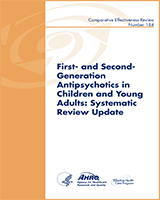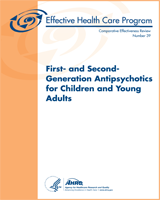Structured Abstract
Objectives:
To review and synthesize the evidence on first-generation antipsychotics (FGA) and second-generation antipsychotics (SGA) for the treatment of various psychiatric and behavioral conditions in children, adolescents, and young adults (ages ≤ 24 years).
Data Sources:
We conducted comprehensive searches in 10 electronic databases from 1987 to February 2011. We searched the grey literature, trial registries, and reference lists.
Methods:
Two reviewers conducted study selection and quality assessment independently and resolved discrepancies by consensus. One reviewer extracted data, and a second reviewer verified the data. We conducted a descriptive analysis for all studies and performed meta-analyses when appropriate.
Results:
Eighty-one studies (64 trials and 17 cohort studies) examined the following conditions: pervasive developmental disorders (12 studies); attention deficit hyperactivity disorder (ADHD) or disruptive behavior disorders (8 studies); bipolar disorder (11 studies); schizophrenia and related psychosis (31 studies); Tourette syndrome (7 studies); behavioral issues (4 studies); and multiple conditions (9 studies). One study reported data on both bipolar disorder and schizophrenia.
The majority of the trials had a high risk of bias. The methodological quality of the cohort studies was moderate. Results are presented by outcome below.
Symptoms: The strength of evidence for all head-to-head comparisons of FGAs and SGAs was low or insufficient to draw conclusions. SGAs were favored over placebo for behavior symptoms (ADHD and disruptive behavior disorders), the Clinical Global Impressions scale (ADHD and disruptive behavior disorders, bipolar disorder, and schizophrenia), positive and negative symptoms (schizophrenia), and tics (Tourette syndrome) (moderate strength of evidence).
Other short- and long-term outcomes: All head-to-head comparisons had low or insufficient strength of evidence. There was no significant difference between SGAs and placebo for suicide-related behaviors (moderate strength of evidence). The evidence was rated as insufficient to draw conclusions for health-related quality of life, involvement with the legal system, and other patient-, parent-, or care provider-reported outcomes for all conditions.
Adverse events: All outcomes comparing FGAs with SGAs had low or insufficient strength of evidence. Outcomes comparing FGAs versus FGAs and FGAs versus placebo had insufficient evidence. Risperidone was favored over olanzapine for dyslipidemia; olanzapine was favored over risperidone for prolactin-related events; and both quetiapine and risperidone were favored over olanzapine for weight gain (moderate strength of evidence). For nearly all outcomes and comparisons, placebo resulted in significantly fewer adverse events than SGAs.
Subpopulations: Thirty-six studies examined the association between various patient subpopulations and outcomes. Most concluded that the results did not differ by subpopulations, or findings were discordant across studies.
Conclusion:
Evidence comparing FGAs with SGAs, various FGAs, and FGAs with placebo was very limited. Some SGAs appear to have a better side-effect profile than other SGAs. Compared with placebo, SGAs have better symptom improvement but more adverse events. Future high-quality research examining head-to-head antipsychotic comparisons is needed.
Contents
Prepared for: Agency for Healthcare Research and Quality, U.S. Department of Health and Human Services1, Contract No. 290-2007-10021. Prepared by: University of Alberta Evidence-based Practice Center, Edmonton, Alberta, Canada
Suggested citation:
Seida JC, Schouten JR, Mousavi SS, Hamm M, Beaith A, Vandermeer B, Dryden DM, Boylan K, Newton AS, Carrey N. First- and Second-Generation Antipsychotics for Children and Young Adults. Comparative Effectiveness Review No. 39. (Prepared by the University of Alberta Evidence-based Practice Center under Contract No. 290-2007-10021.) AHRQ Publication No. 11(12)-EHC077-EF. Rockville, MD. Agency for Healthcare Research and Quality. February 2012.
This report is based on research conducted by the University of Alberta Evidence-based Practice Center (EPC) under contract to the Agency for Healthcare Research and Quality (AHRQ), Rockville, MD (Contract No. 290-2007-10021). The findings and conclusions in this document are those of the author(s), who are responsible for its contents; the findings and conclusions do not necessarily represent the views of AHRQ. Therefore, no statement in this report should be construed as an official position of AHRQ or of the U.S. Department of Health and Human Services.
The information in this report is intended to help clinicians, employers, policymakers, and others make informed decisions about the provision of health care services. This report is intended as a reference and not as a substitute for clinical judgment.
This report may be used, in whole or in part, as the basis for the development of clinical practice guidelines and other quality enhancement tools, or as a basis for reimbursement and coverage policies. AHRQ or U.S. Department of Health and Human Services endorsement of such derivative products or actions may not be stated or implied.
None of the investigators have any affiliations or financial involvement that conflicts with the material presented in this report.
- 1
540 Gaither Road, Rockville, MD 20850; www
.ahrq.gov

